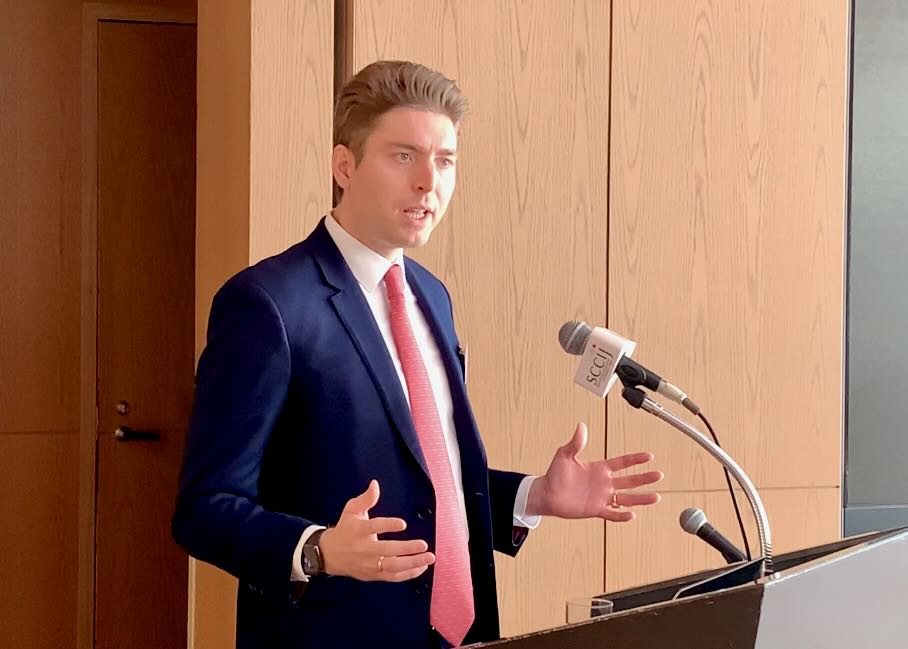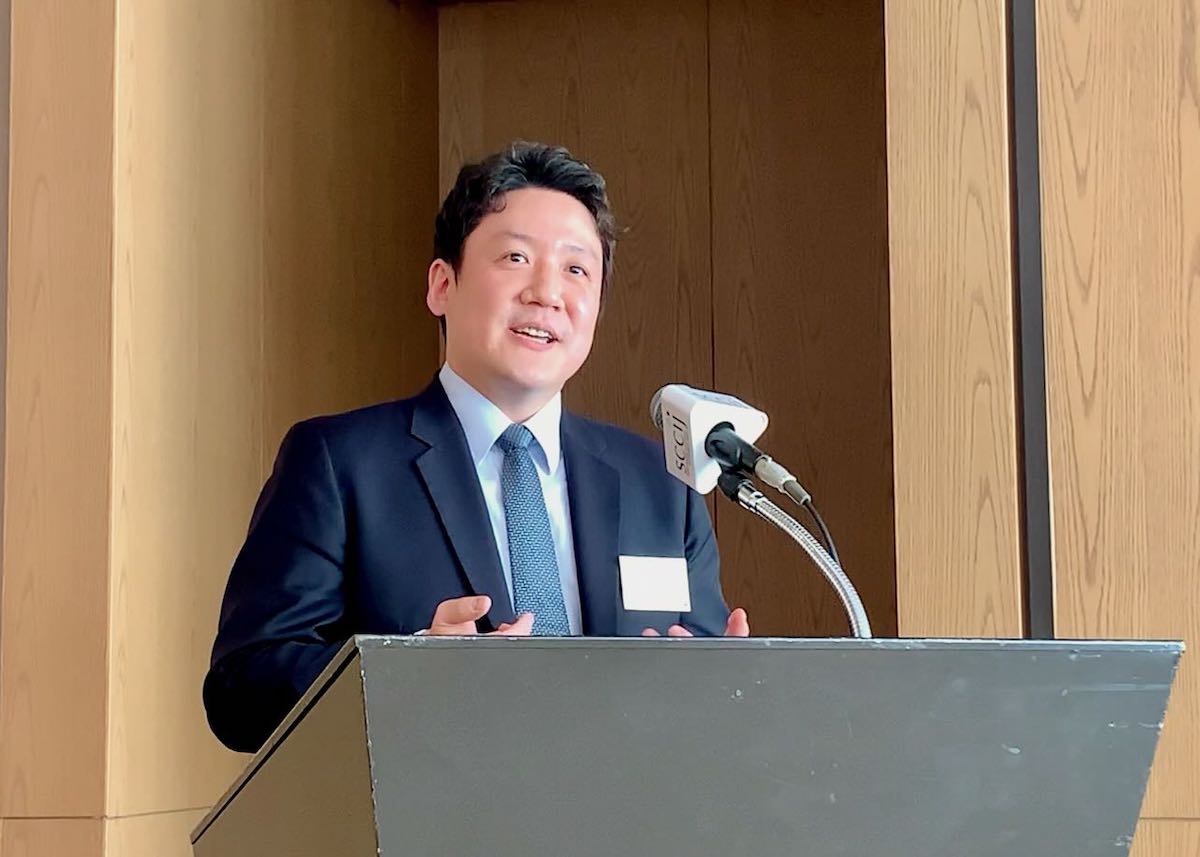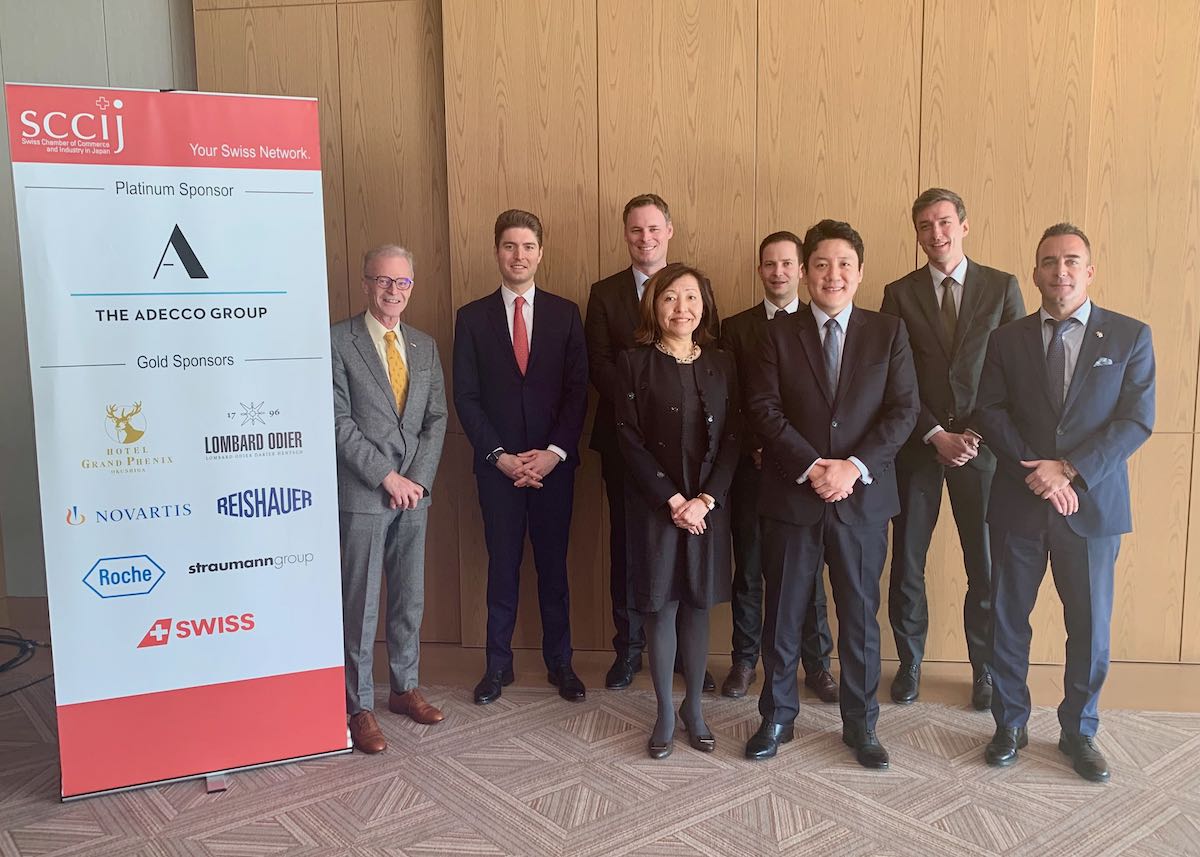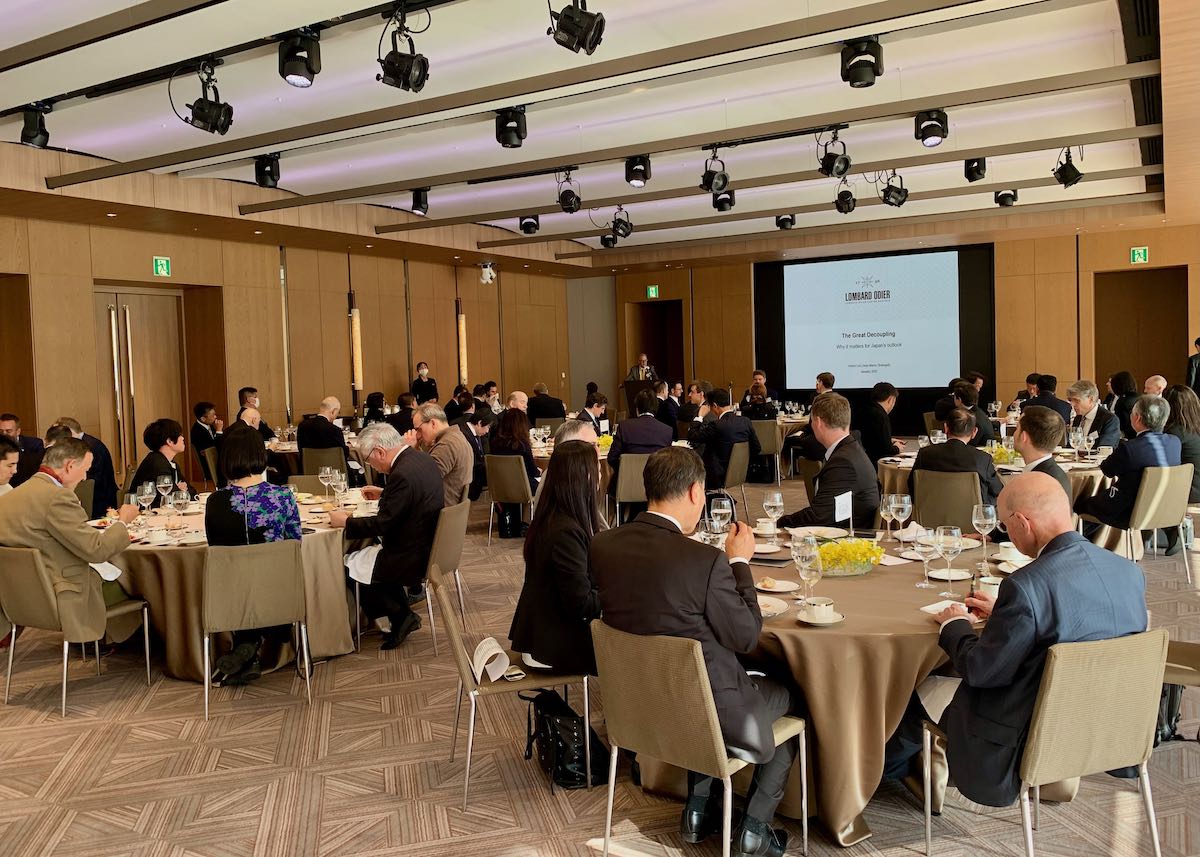Tokyo (SCCIJ) – At the Shinnenkai Luncheon with more than 60 members and guests of the chamber attending, Mr. Pierre-Yves Lombard, Representative Director and Head of Private Banking Japan, and Mr. Homin Lee, Asia Macro Strategist of Lombard Odier Group, shared their views on the decoupling of the global eco-system for high tech trade and investments and the implications for Japan’s economy. We present the key points of their speeches below in a Q&A form.

SCCIJ Shinnenkai Luncheon speaker Mr. Pierre-Yves Lombard, Representative Director and Head of Private Banking Japan.
How optimistic are you for Japan about the new year 2023?
Mr. Pierre-Yves Lombard: We are constructive on Japan’s outlook in 2023 despite somewhat challenging global conditions. The country can probably outperform its industrialized peers on a relative basis. We argue that Japan might even benefit from the ongoing decoupling of the world’s trade and cross-border investment framework as it can regain its global market share as a trusted partner for friend-shoring and supply chain reorientation.
What are the key trends you expect to dominate this year?
P.Y. Lombard: We are paying close attention to the rapid evolution of the US-led export control regime and the resulting bifurcation of the global ecosystems for technology, commodity trade, and finance. Concerns about national security will remain a powerful driver of global trade and investment decisions, and any sensible medium-term economic outlook for the world will have to incorporate the new paradigm of the fracturing of global governance into consideration.

SCCIJ Shinnenkai Luncheon speaker Mr. Homin Lee, Asia Macro Strategist of Lombard Odier Group.
Why are we seeing this sudden burst of expert chatter over decoupling?
Mr. Homin Lee: We are witnessing this shift probably because of the consequential changes that took place in 2022. Before last year, the widely accepted view was that the global economy was undergoing “slowbalization”, i.e. the plateauing of global exchanges of goods and services after two decades (1990s~2000s) of hyper-globalization. As for the decoupling theme itself, many indicators suggest that the world actually increased its dependence on China until last year. But 2023 could mark the end of this trend due to the western responses to the war in Ukraine and the heightened tension over the Taiwan Strait. Export controls outside the WTO framework are proliferating, and the weaponization of commodity trade and global finance is becoming more significant.
What will be a driver of this “bifurcation”?
H. Lee: The real game changer in our view was the US government’s announcement of a new national security concept of maintaining the maximum US lead over its adversaries for key technologies. The US decision in October to cut off China’s entire semiconductor sector from any cross-border exchange of technology and know-how signals that the pressures on the vital sector will rise even more. China faces a difficult path ahead due to these restrictions, but it will certainly keep pushing harder for the indigenous development of leading-edge chip production that is an essential prerequisite for other high-tech sectors such as AI and advanced computing, cloud computing, 5G, and advanced manufacturing. The ultimate concern is that the US and EU could expand these restrictions to other areas like pharmaceuticals.

Shinnenkai Luncheon speakers Mr. Lombard and Mr. Lee of Lombard Odier Group with members and advisors of the SCCIJ executive committee.
Do we have to fear the weaponization of resources, like what Russia did with gas for Europe?
H. Lee: With lithium and some agricultural products, the U.S.-led country block has an edge, but with rare earth and cobalt, the Chinese block has an advantage. Some metals hold the key to many clean technologies, electrification, and associated infrastructure, and many devices need them. China’s clout in the metals supply chain is significant. But the weaponization of commodity trade tends to backfire. For instance, the Russian attempt to weaponize its pipeline gas exports to Europe has more or less failed with the latter implementing an overhaul of its energy system and consumption patterns. Europe is entering the new year with stronger immunity to potential new supply-side shocks from Russia.
We also note that many less developed countries exporting some of these commodities are pursuing their national interests by trading with both sides. Furthermore, the US and its allies are tolerating the supply of commodities from Russia via gray markets that act as a stabilizing mechanism. All in all, we think the severe “weaponization” of resources is not a main risk yet, but it could be if there is an actual military conflict justifying such costly actions.
What are your scenarios for a decoupling??
H. Lee: In our base case, the global tech trade will be driven primarily by US export controls and China’s responses, with the WTO on the sidelines. The US-led block will aim explicitly to thwart China’s self-sufficiency drive and slow down China’s catch-up in technology. The Chinese side will ramp up investments to compensate for the possible loss of tech supplies from unfriendly countries. Trade in other domains like consumer products and services will continue.
In the worst case, we see an outright severing of economic and financial ties between different trade blocs, possibly due to a widening military conflict. If so, all types of tech sharing will be disrupted, and we will get a return to cold-war-like stringent and broad export control arrangements. This is not our base case at the moment.

An impression of the SCCIJ Shinnenkai Luncheon 2023.
Which economies will be in the best position to navigate the base scenario?
H. Lee: Diversification away from China will help the country’s high- and low-tech alternatives, and economies with higher strategic flexibility will have advantages. For the low-tech side, countries such as Mexico, Vietnam, and India may be able to increase its export market share because of industrial players moving out of China. For the high-tech front, we believe that Japan is positioned nicely for the new environment. Hyper-globalization after the end of the cold war has not been kind to Japan’s export market share. But we think that the country’s market share has reached the bottom. Furthermore, Japan has a much lower sensitivity to demand from China than Europe, and it is at the center of key strategic initiatives and cutting-edge trade deals like CPTPP.
But what about Japan's rapid aging?
H. Lee: We think that the aging speed in Japan is manageable in the coming decade in comparison to other industrialized countries, especially in East Asia. Those populations are aging faster than Japan’s. For instance, Japan’s working-age population ratio is set to decline by just 1.2 percentage points over the next 10 years whereas its neighbor South Korea will experience a decline of nearly 7 percentage points for the same period. The country is old, but it is no longer aging faster than many of its industrialized peers.
What kind of changes in Japan’s monetary policy do we have to expect?
H. Lee: Japan’s deflationary mindset is slowly softening after Abenomics. If we are right about Japan’s decent recovery in 2023, we could see another year of above-target inflation and solid wage gains. If so, the Bank of Japan Governor Haruhiko Kuroda will be retiring with his mission to erase deflation accomplished. In our view, the central bank will likely ditch its yield curve control policy but there are some uncertainties on when it will signal this. Perhaps the bank will shift after Kuroda-san’s retirement. Concerning the yen, the period of massive depreciation might be behind us. The yen is still quite cheap despite the recent rebound, and the value of the “real” yen is even lower. We are penciling in USDJPY exchange rate of 120 for the end of this year.
How do you judge the risk of a military conflict between China and Taiwan?
H. Lee: : We believe that the Chinese government will tone down its actions about Taiwan this year and next year. One indicator supporting this view is that Beijing has maintained a diplomatic tone for US-China relations even after the latter implemented unprecedented restrictions on China’s semiconductor sector in October. The ultimate outcome is difficult to predict, but it is reasonable to expect a degree of calm for this year and perhaps 2024.
Will the climate policy announcements be kept despite the current economic troubles?
H. Lee:: The global cooperation on climate change has been a surprising exception to the darkening geopolitical prospect. Key countries’ ambitious emissions targets and pledge to fund poorer countries’ climate transition at COP27 are examples of this progress. We do expect that the public and private sector commitment to fight climate change will remain strong, and we do not rule out the possibility that China’s dominance on metals and some climate-related manufactures (e.g. solar panels) could end up boosting international collaboration despite heightened geopolitical tensions. We do have to bear in mind that these efforts could take a second seat to national security concerns if geopolitical tensions become extremely serious. We will keep monitoring such risks.
Biography of the speaker
Mr. Pierre-Yves Lombard manages Lombard Odier’s private wealth management activities from its Tokyo offices. In his last position, Mr. Lombard was Deputy Head of the Private Clients Unit, Asia ex-Japan at Lombard Odier, driving the growth and expansion of the bank’s private banking business in Asia. Mr. Lombard holds a Master’s in Banking and Finance with honors from the University of St. Gallen and completed an executive MBA program at Harvard Business school.
Mr. Homin Lee is responsible for Lombard Odier’s investment strategy and macro research as well as cross-asset and currency recommendations in Asia. Before joining the firm, Mr. Lee was an economic research analyst at Korea Life Insurance (now Hanwha) Economic Research Institute from 2007-2012, where he managed macro forecasting and thematic research on economies outside South Korea. Mr. Lee holds a master’s degree in economics from the University of Hong Kong and a bachelor’s degree in economics and political science from the University of Pennsylvania.
Text and photos: Martin Fritz for SCCIJ





























